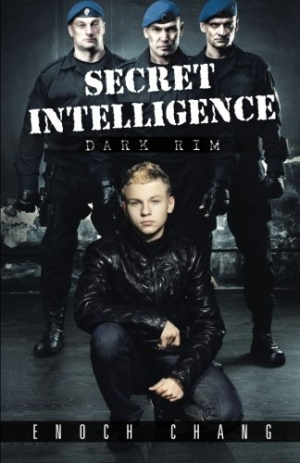Secret Intelligence
Dark Rim
Imaginative details of spy techniques bring excitement to this suspenseful thriller.
Secret Intelligence is an exhilarating story about a boy who is thrust into the dangerous world of secret agents, questionable loyalties, and conflicting organizations. Fifteen-year-old author Enoch Chang’s novel is imaginative and shows great potential.
The first book in Chang’s series introduces Nathan, an average high schooler who spends his free time hanging out with his best friend, Joe. When Nathan is nearly killed by an intelligence agency called the Ventures, his average life is over. Luckily, Nathan’s resourcefulness and quick thinking help him narrowly escape their attacks on his life. As he struggles to figure out why the secret agency is after him, others in the International Intelligence Organization (IIO)—an enemy agency—claim to be protecting him. Trained in the art of spying by the IIO, his attempts to save his aunt from the Ventures lead him to the “deepest depths” of the ocean. Disguised as a teenager on vacation with his uncle—another undercover IIO agent—Nathan must obtain information on a suspected illegal nuclear plant so the IIO will save his aunt.
The imaginative novel excels in its depiction of cleverly advanced gadgets and Nathan’s ability to think on his feet. One particularly exciting moment occurs when the Ventures attempt to kill Nathan during his swim meet by bugging a surveillance camera with a poisoned needle that shoots into his arm and immediately dissolves. While it appears to just be a cramp, Nathan fights to survive in the water. Such creative scenes make the novel an action-packed read for those who enjoy thrilling junior agent novels.
Chang effectively illustrates the relationship between Nathan and his best friend Joe through action rather than summary in scenes like when Joe refuses to leave Nathan alone to fight the Ventures saying “I’d rather be caught with you than to be worrying in the police station.” This friendship—with their intense loyalty to one another and Nathan’s difficulties socially—is compelling and gives a human quality to an otherwise plot-based narrative.
Minuscule details are sometimes overly described—how many meters away something is, the exact amount of time passing, a minor character’s clothing—at the expense of purposeful characterization, making the prose occasionally clunky and awkward. The diction is repetitive and ineffectual at times. Lines like “Nathan held his breathe [sic], his heart was pounding against his chest, threatening to jump out” could be replaced with descriptions of the setting or characterization of the antagonists to create tension.
The author shows the capacity for poetic narration that also sets the tone in moments like when Nathan observes the “soft yet striking illuminating blue” ocean that gives him “a sense of eternity.” This contrasts with another character’s complaint that the view is “irritating,” which perfectly fits his personality. If all the description could be so eloquent, the prose would be stronger.
Thematically, the narrative strikes an interesting balance between campy secret agent fun and dark depiction of the ethical gray area of the powerful agencies Nathan must navigate to save his beloved aunt. Fans of spy thrillers will enjoy this read.
Reviewed by
Paige Van De Winkle
Disclosure: This article is not an endorsement, but a review. The publisher of this book provided free copies of the book and paid a small fee to have their book reviewed by a professional reviewer. Foreword Reviews and Clarion Reviews make no guarantee that the publisher will receive a positive review. Foreword Magazine, Inc. is disclosing this in accordance with the Federal Trade Commission’s 16 CFR, Part 255.

